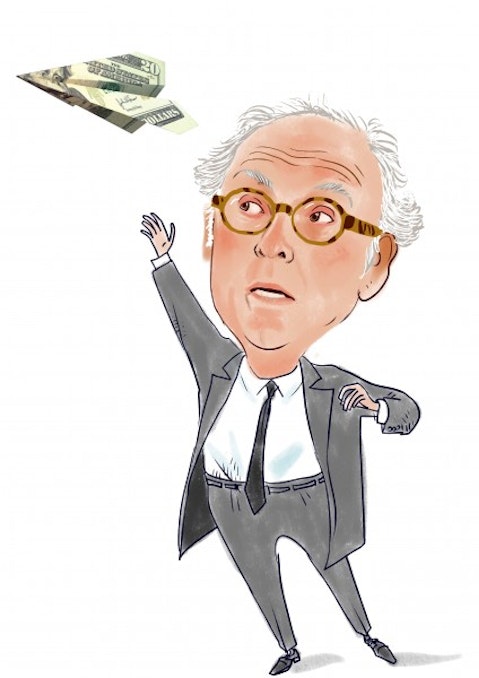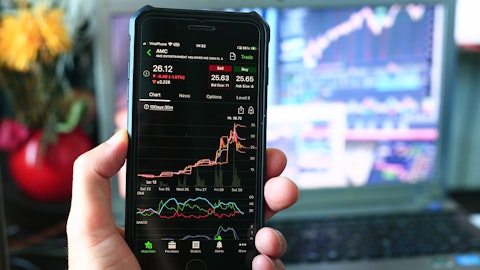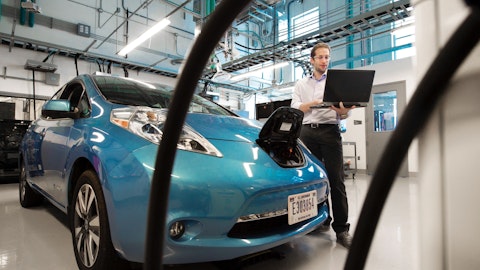In this article, we shall discuss how billionaires love these 10 EV stocks. To skip our detailed analysis of the global EV sector, go directly and see Billionaires Love These 5 EV Stocks.
Energy is the foundational backbone of the global economy. With the escalation of the climate crisis, world leaders are adamant on reducing global carbon emissions, leading the energy sector to rapidly transition from fossil fuels and non-renewables to newer, greener sources of energy. According to the McKinsey Technology Trends Outlook 2022, clean energy technology, with a collective investment of $257 billion in 2021, is leading investments when compared to the 14 most significant technology trends in the world today. Analysts at McKinsey opine that clean energy technology could witness investments peak to more than $1.5 trillion by 2035, a move which will aid in driving zero-carbon solutions and curtailing greenhouse gas emissions. Moreover, another report by McKinsey states that the United States, China, and Europe have boosted environmental regulations by 20% in less than two years. This has caused venture capitalists and hedge fund managers to pour billions into the clean energy sector, which is expected to be up and running in full swing by 2030.
According to a recent report by McKinsey and Company, as technology and interest adapt to the newfound demand for clean energy, the electric vehicle (EV) landscape is rapidly transforming in hopes to keep up. In the United States, electric vehicles sales have increased by more than 40% every year since 2016. By 2035, the largest automotive markets will have successfully completed a 100% transition to an electric model. The report further goes on to ascertain that with petroleum prices skyrocketing due to geopolitical instability in Europe, and efforts by the global community to curtail carbon emissions, the EV sector offers a significant economic opportunity. Furthermore, according to McKinsey, regulations and incentives in China and Europe are likely to catapult EV market share to at least a third of all light-vehicle sales. In the United States however, a significantly aggressive increase in sales is still required to achieve the same level of market share.
An analysis by McKinsey and Company has determined that EV stocks will continue to deliver great returns for at least another two decades. A 2021 survey by the company outlines six key factors which will sustain the current growth in popular EV stocks. These key factors include the correct assessment of value pools, brilliant software integration, domination of the talent war, a renewed and determined focus on green energy sources, maintaining healthy customer relations, and continually offering new purchasing options. Billionaires have been loading up on prominent EV stocks like Tesla Inc. (NASDAQ:TSLA), General Motors Company (NYSE:GM), and Ford Motor Company (NYSE:F).

Israel Englander of Millennium Management
Our Methodology
For this article, we picked some of the most popular EV stocks. We then shortlisted stocks which have shown to be a consistent point of interest for some of the most well-known billionaires in the game. Then, we ranked these stocks based on the number of hedge funds which hold stakes in them, as of Q2 2022.
Insider Monkey’s database tracking 895 elite hedge funds was used to gauge hedge fund sentiment around each stock.
Billionaires Love These 10 EV Stocks
10. Toyota Motor Corporation (NYSE:TM)
Hedge Fund Holdings: 12
Notable Billionaires Having Stakes in TM: D.E Shaw, Paul Tudor Jones, Ken Fisher
Toyota Motor Corp. (NYSE:TM) is a Japanese multinational automotive manufacturer based in Aichi, Japan. It is one of the largest automotive manufacturers in the world, producing over 10 million units per year. As of 2022, Toyota Motor Corp. (NYSE:TM) produces vehicles under four brands namely Daihatsu, Hino, Lexus, and Toyota. In August 2022, Toyota Motor Corp. (NYSE:TM) announced an investment plan of up to $5.6 billion in Japan and the United States, to supply automotive batteries for battery electric vehicles. The company aims to begin battery production between 2024 and 2026.
Of the 12 hedge funds which have stakes in Toyota Motor Corp. (NYSE:TM) as of Q2 2022, 8 are managed by billionaires like D.E Shaw of D.E Shaw, Paul Tudor Jones of Tudor Investment Corporation, and Ken Fisher of Fisher Asset Management. Hedge fund sentiment around Toyota Motor Corp. (NYSE:TM) has increased considerably in the second quarter of 2022, with 12 hedge funds having a collective stake of $849.4 million, compared to Q1 2022, where only 9 hedge funds had stakes in Toyota (NYSE:TM).
In Q2 2022, Toyota Motor Corp. (NYSE:TM) posted an EPS of $0.21, beating estimates of $0.18 by $0.03. Total revenue soared in the second quarter of 2022, with the company posting figures of $232.2 million. Toyota (NYSE:TM) is the world leader in hybrid EV products, and one of the largest companies in the world to encourage mass-market adoption of hybrid vehicles. Toyota Motor Corp. (NYSE:TM) has been criticized for being slow in adding battery powered electric vehicles to its lineup. One of the company’s first all-electric vehicle was RAV4 EV was developed in response to CARB’s mandated determination to make every automation company offer zero-emissions vehicles. Moreover, Toyota Motor Corp. (NYSE:TM) has been developing and building solid-state batteries in partnership with Panasonic, in which the company has more than a thousand patents covering solid-state batteries.
9. Honda Motor Company Ltd. (NYSE:HMC)
Hedge Fund Holdings: 14
Notable Billionaires Having Stakes in HMC: Israel Englander, Jim Simons, Ken Griffin
Headquartered in Minato, Tokyo, Honda Motor Co. (NYSE:HMC) is a Japanese public multinational conglomerate manufacturer of automobiles, motorcycles, electric vehicles, and power equipment. By 2015, Honda (NYSE:HMC) was the eighth largest automobile manufacturer in the world. Billionaires have been increasingly optimistic about Honda (NYSE:HMC), with the likes of Israel Englander of Millennium Management, Jim Simons of Renaissance Technologies, and Ken Griffin of Citadel Investment Group holding significant stakes in the stock as of Q2 2022. As of the second quarter of 2022, Ken Fisher’s Fisher Asset Management is the largest shareholder in the stock, owning more than 8.8 million shares worth around $213 million.
Honda (NYSE:HMC) has had a diverse portfolio of electric vehicles including the all-electric Honda EV Plus that was introduced in 1997, the Honda Fit EV introduced in 2012, and the Honda Accord Plug-in Hybrid, which was introduced in 2013 and has an all-electric range of 13 miles. In August 2022, Honda (NYSE:HMC) and LG Energy Solution announced a joint venture to construct a new lithium-ion battery factory in the U.S. for Honda (NYSE:HMC) and Acura electric vehicles.
Hedge fund sentiment around Honda (NYSE:HMC) has increased in the second quarter of 2022, with 14 hedge funds long the stock, up from 12 funds in the preceding quarter. Of the 14 hedge funds which have stakes in Honda (NYSE:HMC), at least 6 of them are managed by billionaire investors.
Although it has been a long standing player in the ICE market, the company is perfectly set to execute a demonstration line of all-solid-state batteries by 2024 and launch over 30 models by 2030, by investing more than $36 billion in R&D. Moreover, the fully electric 2024 Honda Prologue SUV is set to kickstart a new era of electrified Honda (NYSE:HMC) vehicles. According to Wall Street analysts, Honda’s (NYSE:HMC) EV initiatives make it a long-term buy and hold stock, as the strong legacy business of the company facilitates its penetration of the EV market.
8. XPeng Inc. (NYSE:XPEV)
Hedge Fund Holdings: 24
Notable Billionaires Having Stakes in XPEV: Jim Simons, Ray Dalio, Catherine D. Wood
Headquartered in Guangzhou, Guangdong, XPeng Inc. (NYSE:XPEV) is a Chinese auto manufacturing company which specializes in the production and development of electric vehicles. As of the second quarter of 2022, XPeng (NYSE:XPEV) posted an EPS of -$0.46, trailing behind estimates of -$0.29 by $0.17. On August 24, Citi analyst Jeff Chung lowered the price target on XPeng (NYSE:XPEV) to $27.87 from $51.59, maintaining a Buy rating on the stock. In a research note, the analyst attributed the new price target to the company’s Q2 2022 returns, noting that the Q3 sales volume guidance is incredibly conservative. Due to multiple uncertainties, including the pandemic, consumption downgrade, and supply chain challenges, the volume forecasts were lowered.
Investor interest around XPeng (NYSE:XPEV) has depleted in the second quarter of 2022, with 24 hedge funds long the stock, compared to 26 in the preceding quarter. Like Tesla Inc. (NASDAQ:TSLA), General Motors Company (NYSE:GM), and Ford Motor Company (NYSE:F), XPeng (NYSE:XPEV) is also an EV stock which is incredibly loved by billionaires, with prominent billionaires like Jim Simons of Renaissance Technologies, Ray Dalio of Bridgewater Associates and Catherine D. Wood of ARK Investment Management having significant stakes in XPeng (NYSE:XPEV). As of Q2 2022, billionaire Chase Coleman’s Tiger Global Management LLC is the largest shareholder in XPeng (NYSE:XPEV), owning more than 4.3 million shares worth $138.3 million.
Of late, XPeng (NYSE:XPEV) has seen an increase in product sales. However, the company’s rate of growth has seen a significant year-over-year decline. In August 2022, XPeng (NYSE:XPEV) delivered 9,578 electric cars, 33% more than a year ago. However, though these figures may seem impressive at surface level, they are no where close to the 100%, 200%, or higher increase that the company has reported in the past. XPeng’s (NYSE:XPEV) P7, the company’s top-selling model, appears to be the reason behind the slight decrease year-over-year. So far in 2022, XPeng (NYSE:XPEV) car sales have exceeded 90,000 units, making it one of the most prospective emerging auto brands in China.
7. NIO Inc. (NYSE:NIO)
Hedge Fund Holdings: 25
Notable Billionaires Having Stakes in NIO: John Overdeck, D.E Shaw, Israel Englander
Based in Shanghai, NIO Inc. (NYSE:NIO) is a Chinese multinational automobile manufacturer which specializes in the design, development, and production of electric vehicles. The company is infamous for its revolutionary development of battery-swapping stations for the company’s vehicles, meant as an alternative to conventional charging stations. Billionaires have been crazy about the stock in 2022, stacking up on shares significantly since March 2021. These billionaires are John Overdeck of Two Sigma Advisors, D.E. Shaw of D E Shaw, and Israel Englander of Millennium Management. Jim Simons’ Renaissance Technologies is the biggest stakeholder in NIO Inc. (NYSE:NIO), with the billionaire investor owning more than 17.8 million shares worth at $386 million.
On September 1, NIO Inc. (NYSE:NIO) announced its August 2022 delivery results, declaring that the company delivered 10,677 vehicles in August 2022, pointing to a percentage increase of 81.6% year-over-year. Furthermore, in August, the production and delivery of the ES7, a mid-large five-seater premium start electric SUV based on NIO Inc. (NYSE:NIO), has begun to take flight steadily. Over 398 ES7s were delivered to users in August 2022.
Horos Asset Management, an investment management firm, mentioned NIO Inc. (NYSE:NIO) in their Q1 2022 investor letter. This is what they had to say:
“At the beginning of April the CSRC (China Securities Regulatory Commission) announced possible changes in its regulation that would allow this inspection by foreign auditors, provided that the companies previously communicate to this body the state secrets that would be exposed, as well as the sensitive information that they might have to hand over, and the subsequent audit is carried out in a framework of collaboration with the CSRC. In short, a move in the direction desired by the SEC, although still far from the optimal result, that is, unrestricted access to information. While these negotiations between the two regulatory bodies are progressing, Chinese companies have to decide how best to preserve their interests. Other entities, such as the electric vehicle manufacturer Nio (NYSE:NIO), have just started trading on this stock market.”
6. Stellantis N.V. (NYSE:STLA)
Hedge Fund Holdings: 25
Notable Billionaires Having Stakes in STLA: Ken Griffin, Israel Englander, Steve Cohen
Headquartered in Amsterdam, Stellantis N.V. (NYSE:STLA) is a Dutch multinational automotive manufacturing corporation which specializes in the design, development, manufacture and sale of ICE and EV units. As of 2021, Stellantis N.V. (NYSE:STLA) is the fifth largest automaker in the world in terms of global vehicle sales in 2021, with more than 300,000 employees in over 130 countries all around the world.
Hedge fund sentiment around Stellantis N.V. (NYSE:STLA) has worsened vigorously, with only 25 hedge funds long the stock in the second quarter of 2022, compared to 29 in Q1 2022. Like Tesla Inc. (NASDAQ:TSLA), General Motors Company (NYSE:GM), and Ford Motor Company (NYSE:F), Stellantis N.V. (NYSE:STLA) is a billionaire-favorite stock, with prominent billionaires like Ken Griffin, and Israel Englander having enormous stakes in the stock. Arrowstreet Capital is the largest shareholder in the stock as of Q2 2022, with the hedge fund owning more than 37 million shares worth at $456.8 million.
On August 2, RBC analyst Tom Narayan raised the price target of Stellantis N.V. (NYSE:STLA), to EUR 21 from EUR 19, maintaining a Sector Perform rating on the shares.
Click to continue reading and see Billionaires Love These 5 EV Stocks.
Suggested Articles:
- 15 Largest Distribution Companies In The World
- Top 10 Video Gaming Stocks To Buy Now
- 15 Largest Chemical Companies in the World
Disclosure: none. Billionaires Love These 10 EV Stocks is originally published on Insider Monkey.





